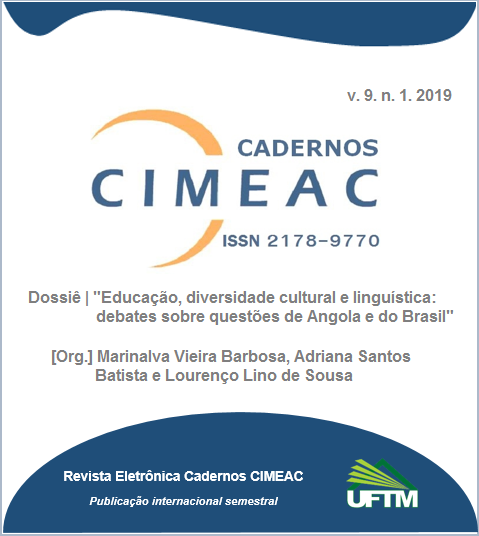O lugar do pesquisador na construção de conhecimento: produção acadêmica sobre língua(s) em Angola / The place of the researcher in the construction of knowledge...
DOI:
https://doi.org/10.18554/cimeac.v9i1.3865Resumen
Este artigo estuda a imagem de língua que circula em uma dissertação de mestrado realizada em uma universidade portuguesa, sobre a variação linguística em Angola. A questão norteadora é: Quais são as imagens de língua enunciadas na dissertação sobre a Língua Portuguesa em Angola? Diante disso, pretendeu-se investigar quais são as escolhas lexicais usadas para caracterizá-la, observando, desta forma, as estratégias textuais e discursivas que contribuem para a construção e disseminação de determinadas imagens de língua. Foram mobilizados, como aparato teórico, dentre outros estudos, Pêcheux (1997), acerca das formações imaginárias; Bronckart (2009), sobre as modalizações linguísticas; e Osakabe (1999), no que se refere à enunciação do sujeito. Realizou-se um levantamento de dados a partir de uma dissertação de mestrado como corpus de análise disponibilizada no repositório de uma universidade portuguesa. Constatou-se que o predomínio de determinada língua, no caso a Língua Portuguesa falada em Angola, estabelece uma hegemonia e consequentemente desigualdades, e isto implica ideologias linguísticas associadas a posicionamentos dentro de um campo social. Também a imagem que se constrói, diante da análise no texto acadêmico, é de que o domínio da Língua Portuguesa, em contraposição às línguas faladas em Angola, é um aspecto de ascensão social determinado por meio de instâncias regulamentadoras. Também foi identificada uma polarização entre língua(s) nacional(is) e língua portuguesa, bem como a unificação da língua e sua imposição.
Palavras-chave: Análise do discurso; Formações imaginárias; Modalização; Língua Portuguesa.
ABSTRACT: This article studies the image of the language that circulates in a master's dissertation held at a Portuguese university, about linguistic variation in Angola. The guiding question is: What are the language images enunciated in the dissertation on the Portuguese Language in Angola? In view of this, it was intended to investigate the lexical choices used to characterize it, thus observing the textual and discursive strategies that contribute to the construction and dissemination of certain language images. Pêcheux (1997), about imaginary formations; Bronckart (2009), on linguistic modalizations; and Osakabe (1999), regarding the enunciation of the subject was mobilized, as a theoretical apparatus, among other studies. Data were collected from a master's dissertation as a corpus of analysis available in the repository of a Portuguese university. It was found that the predominance of a given language, in the case of the Portuguese language spoken in Angola, establishes hegemony and consequently inequalities, and this implies linguistic ideologies associated with positions within a social field. Also the image that is constructed, in the face of the analysis in the academic text, is that the domain of the Portuguese Language, in contrast with the languages spoken in Angola, is an aspect of social ascension determined by means of regulatory bodies. A polarization between national language(s) and Portuguese language was also identified, as well as the unification of the language and its imposition.
Keywords: Discourse analysis; Imaginary formations; Modulations; Portuguese Language.
Descargas
Publicado
Número
Sección
Licencia
Os autores que publicam nesta revista concordam com os seguintes termos:
(a) Não cobramos dos autores para a publicação neste periódico.
(b) Autores mantém os direitos autorais e concedem à revista o direito de primeira publicação, com o trabalho simultaneamente licenciado sob a Licença Creative Commons que permite o compartilhamento do trabalho com reconhecimento da autoria e publicação inicial nesta revista.
(c) Autores têm permissão e são estimulados a difundir e a distribuir a versão publicada de seu trabalho online (ex.: em repositórios institucionais ou na sua página pessoal) após o processo editorial, já que isso pode aumentar o impacto e a citação do trabalho publicado (Veja O Efeito do Acesso Livre).
* * *
AUTHORS COPYRIGHT AND PUBLISHING RIGHTS
Authors who publish with this journal agree to the following terms:
(a) This journal does not charge authors for publication.
(b) Authors retain copyright and grant the journal right of first publication with the work simultaneously licensed under a Creative Commons Attribution License that allows others to share the work with an acknowledgement of the work's authorship and initial publication in this journal.
(c) For authors whose articles have been accepted: authors are permitted and encouraged to post their work online (e.g., in institutional repositories or on their website) after the publication of the text in Cadernos CIMEAC, as it can lead to productive exchanges as well as earlier and greater citation of published work (See The Effect of Open Access).

 10.18554/cimeac
10.18554/cimeac

